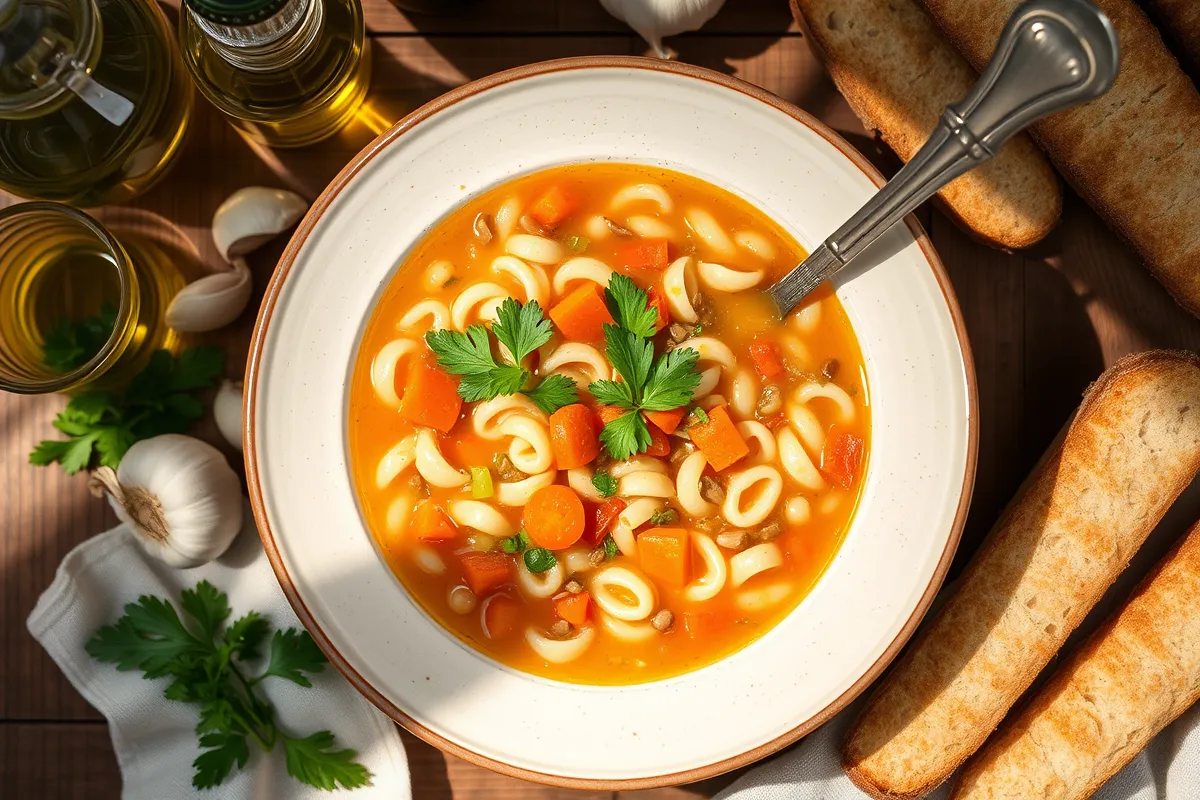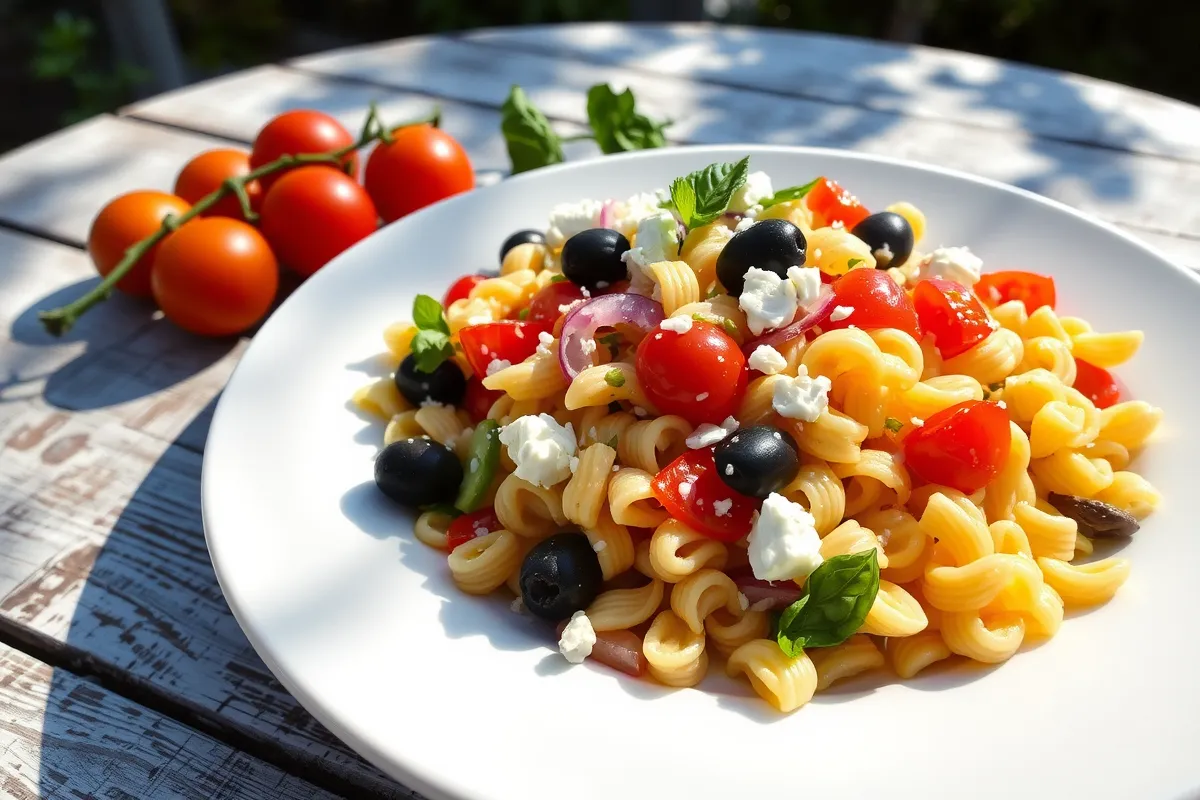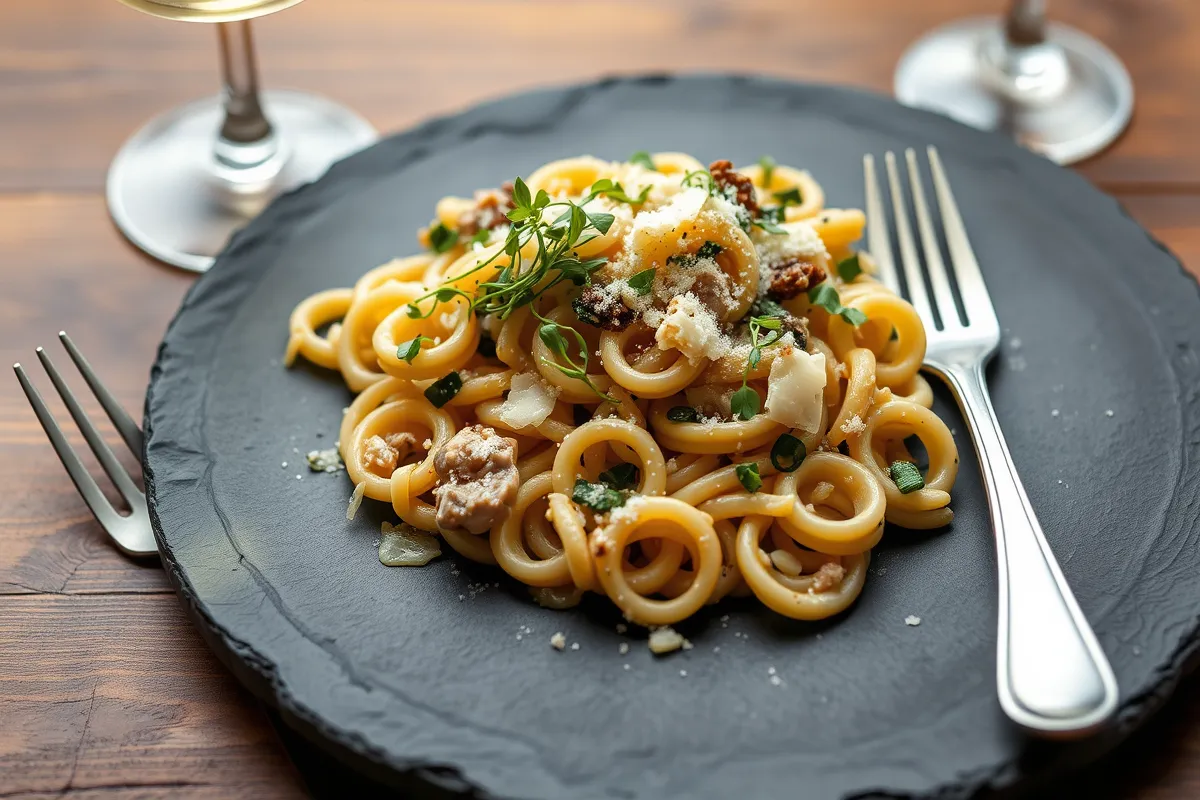Introduction
Ditalini pasta may be small, but it’s mighty when it comes to versatility. Whether you’re crafting a hearty soup, a refreshing salad, or a warm, cheesy casserole, ditalini recipes bring endless possibilities to your table. In this guide, we’ll explore not only classic dishes but also creative twists, cooking tips, and how to adapt ditalini to fit various dietary needs. Ready to take your pasta game to the next level? Let’s dive in!
Part 1: What is Ditalini Pasta?
Understanding Ditalini Pasta: Small Yet Mighty
Ditalini, meaning “little thimbles” in Italian, is a short, tube-shaped pasta. Its unique size and shape make it perfect for soaking up flavors, whether in brothy soups or creamy casseroles. This pasta originated in southern Italy and has become a pantry staple in kitchens worldwide due to its versatility and adaptability.
Why Ditalini is a Favorite Among Pasta Lovers
Many home cooks adore ditalini because it cooks quickly and complements an array of dishes. Its bite-sized form adds texture to recipes like Pasta e Fagioli or makes salads more enjoyable to eat. If you’ve ever thought of pasta as boring, this little gem might change your mind.
Popular Uses for Ditalini
From Italian comfort foods to everyday quick dinners, ditalini shines in:
- Soups: Think of hearty dishes like chicken soup or minestrone.
- Salads: Its small size pairs well with fresh vegetables and tangy dressings.
- Casseroles: Who doesn’t love cheesy baked pasta?
- Simple Sides: A drizzle of olive oil, herbs, and a sprinkle of parmesan make it irresistible.
Part 3: Classic and Modern Ditalini Recipes
Classic Ditalini Recipes
Ditalini Soup Recipes

- Pasta e Fagioli (Italian Pasta and Bean Soup)
A timeless comfort food, Pasta e Fagioli features tender ditalini mingling with creamy beans in a rich, tomato and herb-infused broth. Additionally, this dish is hearty, nutritious, and perfect for chilly evenings. Pair it with crusty bread to complete the meal, creating an experience that feels like a warm hug in every bite. - Chicken and Ditalini Soup
This hearty classic combines the savory flavors of chicken, carrots, and celery with ditalini pasta. It’s a go-to for those under-the-weather days when nothing but a comforting bowl of soup will do.
Traditional Ditalini Salads
- Ditalini Pasta Salad with Vegetables
Think about summer picnics, casual outdoor gatherings, and light, refreshing lunches on warm days. This delightful salad effortlessly combines the best of simple, fresh, and wholesome ingredients. To start, mix perfectly cooked ditalini pasta with crisp, diced cucumbers, colorful bell peppers, and juicy, sweet cherry tomatoes. Furthermore, adding a handful of freshly chopped herbs, such as parsley or dill, can elevate the dish with a burst of flavor. A light dressing made with olive oil, lemon juice, and a hint of garlic brings it all together, making this salad a crowd-pleasing choice for any sunny day. Additionally, a sprinkle of fresh herbs like basil or parsley enhances the dish’s aroma, while a drizzle of zesty lemon vinaigrette ties all the flavors together. Each component brings its unique texture and taste, ensuring every bite is vibrant, satisfying, and perfect for summer dining.
2. Mediterranean Ditalini Salad
A true celebration of Mediterranean flavors, this salad combines hearty ditalini pasta with bold, flavorful ingredients. Mix the pasta with tangy olives, thinly sliced red onions, and crumbled feta cheese. Then, enhance the dish with a drizzle of high-quality olive oil and a splash of red wine vinegar.
For added depth, sprinkle in oregano or a pinch of crushed red pepper flakes. The result is a balanced dish that’s both savory and slightly tangy. Whether served as a side dish alongside grilled meats or enjoyed as a light main course, this Mediterranean salad never disappoints. Its versatility ensures it’s a hit at dinner parties, potlucks, or even quick weekday meals.
Homestyle Ditalini Casseroles
- Cheesy Ditalini Bake
This casserole layers cooked ditalini with marinara sauce, gooey mozzarella, and a sprinkle of parmesan. It’s baked to golden perfection, offering a cheesy, bubbly dish that’s sure to be a crowd-pleaser. - Ditalini with Ground Beef and Tomato Sauce
Ground beef, onions, and garlic combine with tomato sauce and ditalini to create a hearty one-pot meal. This recipe is perfect for busy weeknights when you want something warm and satisfying without a lot of fuss.
Innovative and Modern Ditalini Recipes
Ditalini in Fusion Dishes
- Ditalini Stir-Fry with Asian Veggies
A creative twist on pasta, this dish sautés ditalini with crisp vegetables like snap peas, carrots, and bok choy in a soy-based sauce. It’s a quick, healthy dinner that merges Italian and Asian flavors effortlessly. - Ditalini Tacos
Yes, tacos! Ditalini can make a surprising addition to taco fillings. Combine cooked ditalini with black beans, corn, and a zesty seasoning mix, then spoon it into tortillas for a fun and unexpected meal.
Gourmet Ditalini Dishes
- Truffle Ditalini with Parmesan
This luxurious dish elevates ditalini by tossing it in a creamy truffle-infused sauce and topping it with freshly grated parmesan. Its simplicity allows the truffle flavor to shine while still feeling indulgent. - Ditalini Risotto-Style Dish
Using ditalini instead of rice, this recipe mimics the creamy texture of risotto. Slowly simmered in vegetable broth and finished with a touch of cream and herbs, it’s a delightful way to try something new with pasta.
Stay tuned for more in Part 4, where we’ll explore tips for cooking ditalini perfectly and uncover its unexpected health benefits!
Part 4: Tips and Health Benefits
Tips for Cooking Ditalini Perfectly
Getting the perfect al dente texture with ditalini is crucial to elevate any recipe. Start by using a large pot of water—approximately one gallon per pound of pasta—and bring it to a rolling boil. Add a generous pinch of salt to enhance the pasta’s natural flavor. Once boiling, add the ditalini and stir to prevent sticking. Cook for 7–9 minutes, checking frequently toward the end to ensure the texture is firm yet tender.
When it comes to sauces, ditalini’s versatility shines. It pairs beautifully with broth-based sauces for soups, light vinaigrettes for salads, or rich tomato and cream sauces for casseroles. Each piece absorbs flavor without becoming mushy, making it a reliable choice across dishes.
After cooking, drain the pasta and toss it with a splash of olive oil if it’s not being served immediately. For storage, refrigerate cooked ditalini in an airtight container for up to three days. If you need to reheat it, sprinkle a little water before microwaving to restore moisture and maintain its texture.
Health Benefits of Using Ditalini in Recipes
Ditalini pasta isn’t just tasty; it can also be a nutritious addition to your meals. Standard ditalini is a good source of carbohydrates, providing energy and supporting brain function. It’s also low in fat, making it suitable for most balanced diets. For an extra boost of fiber and nutrients, opt for whole-grain ditalini. Whole-grain varieties are packed with B vitamins and minerals like iron and magnesium.
Incorporating ditalini into a balanced diet is easy. Pair it with fresh vegetables, lean proteins like chicken or legumes, and healthy fats such as olive oil. These combinations create a filling, nutrient-dense meal that satisfies without overloading on calories.
For those with dietary restrictions, there are plenty of options! Gluten-free ditalini, made from rice or chickpea flour, provides a similar texture while catering to those avoiding gluten. Whether you’re focused on heart health, blood sugar control, or weight management, ditalini can be adapted to fit your needs.
Nutritional Benefits of Ditalini Pasta
Ditalini pasta is a nutrient-packed choice that provides energy and essential nutrients for a balanced diet. Its nutritional profile varies depending on whether it’s made with refined or whole-grain flour, but here’s an approximate breakdown of the nutritional content per 100 grams of cooked ditalini pasta:
| Nutrient | Amount (Per 100g) | Daily Value (%) |
|---|---|---|
| Calories | 157 kcal | 8% |
| Carbohydrates | 31 g | 10% |
| Protein | 5.8 g | 12% |
| Fat | 0.9 g | 1% |
| Fiber | 1.8 g | 7% |
| Iron | 0.8 mg | 4% |
| Magnesium | 13 mg | 3% |
| Calcium | 10 mg | 1% |
| Sodium | 1 mg | 0% |
Key Points About Ditalini Nutrition
- Energy Source: Ditalini’s carbohydrate content provides a steady energy supply, making it a great addition to active lifestyles.
- Low Fat: With less than 1 gram of fat, ditalini fits easily into low-fat meal plans.
- Protein Support: Offers a moderate protein amount, excellent for pairing with legumes, meats, or dairy for a protein-rich dish.
- Rich in Fiber: Whole-grain ditalini enhances dietary fiber intake, supporting gut health and satiety.
- Micronutrient Value: Contains small but beneficial amounts of essential minerals like iron, magnesium, and calcium.
Incorporating ditalini into your meals not only adds flavor but also contributes to a nutritious, balanced diet.
Ditalini Recipes for Special Diets

Gluten-Free Ditalini Recipes
For gluten-sensitive or celiac diners, gluten-free ditalini made from alternative flours such as rice, quinoa, or chickpeas is an excellent option. You can even try making it at home using almond flour or cassava flour. Toss gluten-free ditalini into soups or salads for a seamless substitution that tastes great.
Vegan and Vegetarian Ditalini Recipes
Ditalini lends itself beautifully to plant-based meals. Combine it with high-protein options like lentils, black beans, or chickpeas to create satisfying vegan dishes. For a hearty soup, ditalini with vegetable broth, spinach, and white beans is an instant classic. Vegetarian salads featuring roasted veggies, feta cheese, and a lemon-tahini dressing also showcase this pasta’s adaptability.
Low-Calorie and Keto-Friendly Variations
Looking for lighter options? Ditalini can be swapped with zucchini noodles or spiralized carrots for a low-carb alternative. If you’re on a keto diet, consider using cauliflower-based ditalini substitutes, which mimic the shape while keeping carbs minimal. For a satisfying keto meal, serve these alternatives with creamy avocado-based sauces or pesto.
Part 5: Pairings and FAQs

